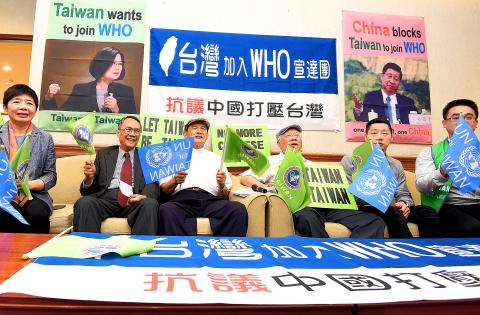As the nation waited yesterday for an invitation to the World Health Assembly (WHA) — the final day for registration — campaigners and medical groups urged the legislature to issue a formal condemnation of Beijing and support a bid to seek WHA participation under the name “Taiwan” rather than “Chinese Taipei.”
A coalition of activists and lawmakers called for Taiwan’s participation in the WHA — the decisionmaking body of the WHO — in Geneva, Switzerland, from May 22 to May 31 and condemned China for attempting to exclude the nation from the global disease prevention network.
They urged legislators across party lines to condemn China’s suppression of Taiwan and support the bid to seek formal WHO membership and participation in other international organizations or competitions under the name “Taiwan.”

Photo: Chu Pei-hsiung, Taipei Times
Democratic Progressive Party (DPP) Legislator Lee Chun-yi (李俊俋) said the DPP caucus would issue a condemnation by Friday if the Chinese Nationalist Party (KMT) caucus did not endorse a collective condemnation, which would likely be the case.
Taiwan-UN Alliance president Michael Tsai (蔡明憲) said the government’s efforts to seek WHA participation was “too little, too late,” adding that President Tsai Ing-wen’s (蔡英文) goal of maintaining the cross-strait “status quo” should not compromise national interest or sovereignty.
While the president’s moves promoting Taiwan’s WHA participation, including a splurge of Twitter posts and an interview with a foreign news agency, were commendable, her administration did not act promptly, Michael Tsai said.
During a general session in January of the WHO executive board, which decided the agenda of this month’s WHA meeting, Taiwan could have, but did not, seek the help of its diplomatic allies or friendly countries to ensure its participation in the WHA, he said.
“The government sought diplomatic help from the US and Japan too late,” he said.
“To maintain the ‘status quo’ does not mean self-constraint,” he said. “The government has to pursue the nation’s interests while maintaining policy flexibility.”
People News chairman Chen Yung-hsin (陳永興) said whatever is the “right status quo” — such as the political separation between Taiwan and China — should be maintained, but the “wrong status quo” — such as the so-called “1992 consensus” — has to be scrapped.
New Power Party Legislator Freddy Lim (林昶佐) said that he “does not know how China expects Taiwan to further suppress and ‘castrate’ itself when the Taiwanese delegation to the WHA had voluntarily referred itself as ‘Chinese Taipei’ at WHA meetings.”
This kind of “self-suppression” does not guarantee Taiwan’s inclusion in the WHA this year, Lim said.
“Since self-limitation cannot guarantee uninterrupted participation in the WHA, Taiwan should instead use the name ‘Taiwan’ to join international organizations, so the nation can treat itself normally and stop repressing itself,” the NPP lawmaker said.
Foundation of Medical Professionals Alliance in Taiwan executive director Lin Shih-chia (林世嘉) said representatives of the G8 countries had pushed for Taiwan’s participation in the WHA — “a very significant diplomatic achievement” amid China’s attempts to exclude Taiwan — and the government should form an inter-ministerial task force to ensure future participation.
Alliance members are to leave for Geneva on Friday next week, where they will stage protests against China’s interference and promote Taiwan’s participation in the WHO, Michael Tsai said.
The legislature’s Foreign Affairs and National Defense Committee is mulling an official trip to Geneva during the WHA meeting to push for Taiwan’s inclusion, DPP Legislator Wang Ding-yu (王定宇) said.

US President Donald Trump said "it’s up to" Chinese President Xi Jinping (習近平) what China does on Taiwan, but that he would be "very unhappy" with a change in the "status quo," the New York Times said in an interview published yesterday. Xi "considers it to be a part of China, and that’s up to him what he’s going to be doing," Trump told the newspaper on Wednesday. "But I’ve expressed to him that I would be very unhappy if he did that, and I don’t think he’ll do that," he added. "I hope he doesn’t do that." Trump made the comments in

Japanese footwear brand Onitsuka Tiger today issued a public apology and said it has suspended an employee amid allegations that the staff member discriminated against a Vietnamese customer at its Taipei 101 store. Posting on the social media platform Threads yesterday, a user said that an employee at the store said that “those shoes are very expensive” when her friend, who is a migrant worker from Vietnam, asked for assistance. The employee then ignored her until she asked again, to which she replied: "We don't have a size 37." The post had amassed nearly 26,000 likes and 916 comments as of this

Tourism in Kenting fell to a historic low for the second consecutive year last year, impacting hotels and other local businesses that rely on a steady stream of domestic tourists, the latest data showed. A total of 2.139 million tourists visited Kenting last year, down slightly from 2.14 million in 2024, the data showed. The number of tourists who visited the national park on the Hengchun Peninsula peaked in 2015 at 8.37 million people. That number has been below 2.2 million for two years, although there was a spike in October last year due to multiple long weekends. The occupancy rate for hotels

A cold surge advisory was today issued for 18 cities and counties across Taiwan, with temperatures of below 10°C forecast during the day and into tonight, the Central Weather Administration (CWA) said. New Taipei City, Taipei, Taoyuan and Hsinchu, Miaoli and Yilan counties are expected to experience sustained temperatures of 10°C or lower, the CWA said. Temperatures are likely to temporarily drop below 10°C in most other areas, except Taitung, Pingtung, Penghu and Lienchiang (Matsu) counties, CWA data showed. The cold weather is being caused by a strong continental cold air mass, combined with radiative cooling, a process in which heat escapes from